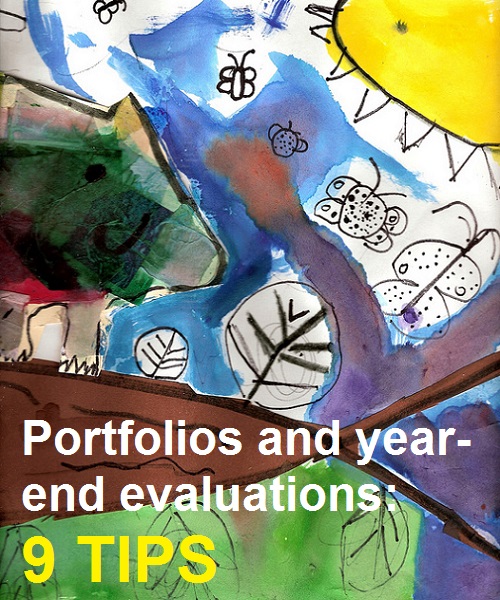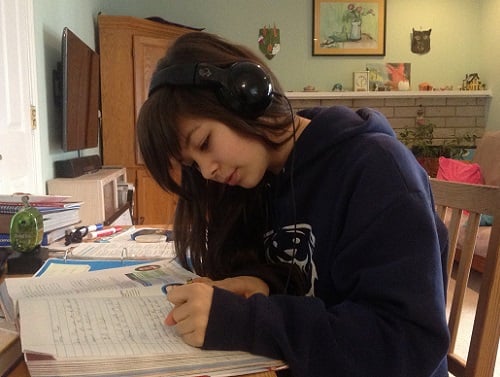You put together a portfolio of the year’s school work and share it with an evaluator of some kind. In Ohio, for instance, we meet with a certified teacher who will vouch for the fact that each child has “gone up a grade level” based on pawing through whatever materials I’ve cobbled together to share with her. In some homes, that “evaluator” turns out to be the other curious parent who would like to know what the heck you’ve been doing all day every day. It may be your anxiety checking in to make sure you didn’t waste an entire year because you were pregnant for half of it.
The year-end gaze back through ten months of education is powerful in aiding you for the next year (I recommend it!) whether or not you need to provide an official portfolio for evaluation by the state representative.
Here are my tips, gleaned from over a decade of that practice.
1. Enjoy year-end evaluations. This is your chance to review your year with your kids. You’ll be surprised to discover that you did a whole lot more than your guilt allowed you to recall in the middle of the night.
2. Be patient as you hunt through the house for evidence that your children got an education. You aren’t only looking for papers with handwriting on them. You might see a framed Van Gogh print on the wall and remember discussing it over breakfast. Grab it. Bring it to the pile of “stuff” (I’ll tell you what to do with it in a minute). The bird feeders in the backyard and the binoculars should join you at the table too. The box of dress up clothes might yield another memory of the kids acting out Colonial USA story-lines from books you read to them in the fall. Page through, scroll through your calendar to remind yourself of field trips (which include going to the movies to see “Frozen,” the walk through the Asian food section of your local market where you picked out the starfruit to try for teatime, the night walk to listen for owls, and the surprise visit to Daddy’s work place). Make a list with dates. Scroll through the iPhoto files as well to remind yourself of activities you are now forgetting. You can print photos and mount them on paper, adding them to the collection of items you will share with your evaluator.
3. Gather the papers too, though. If you aren’t a notebooker (I was for some years, not so much others), you’ll have a collection of the student’s work. You can select samples for the portfolio. Pick pages written in all three seasons (fall, winter, and spring) to show progress. If you don’t have notebooks to help you, the search may require help from the kidlets. Papers get tucked into every corner of the house (under couches, in dresser drawers, in the art room, smashed in the textbook). The goal is to create a representative sample for the evaluator, not an exhaustive (and exhausting) one. 4-5 pages per subject per child is plenty (unless otherwise instructed).
4. Provide a written narrative of the child’s progress in any subject, particularly those without a paper trail. Let’s say that you spent the year learning about art history, but no one journaled about it, no one wrote a little essay about it, no one put on dress up clothes and acted out a painting. How can you show the evaluator that you studied art? Write it up yourself. Narrate what you did, like this: “This past year, we studied art history. Noah, age 9, became fascinated with Paul Klee’s work. We enjoyed these paintings (include titles). Noah’s primary interest in Klee’s work were the whimsical figures. We saw Klee’s paintings several times at these museums. One time Noah said to me, “…….” (You might ask Noah on the spot for a quote, if you can’t remember. Ask naturally, so that he isn’t resistant, “Remember when we studied that painting by Paul Klee that had the X in it? What did you like about it? Do you remember?”).” Your written narrative should take a few paragraphs. Tell it all, in story form.
The written narrative can incorporate all the children, or it can be specific to one child. If a child is working on math, but doing it all with manipulatives and without text books, write about the processes that were mastered and by what tools. The written narrative is also a wonderful way to record the progress of a child that you can use next year for yourself to see how far that child has come (we all have educational amnesia and forget that our kids ever learned a single thing…every year).
Bring a reading list too (books you read to the kids, books the kids read themselves—multiple readings count!). You’ll be amazed at how many words your kids read or heard read in one year. Truly impressive.
5. Bring books, posters, and tools to the evaluation. I used to put everything in a couple of crates and haul it all into Lisa’s living room. Then I’d play show and tell—one child at a time, or sometimes all at once as I covered a subject at a time. I’d pull out the globe and discuss which countries we studied and how. I’d show Lisa our math manipulatives, I’d lay out the calendar that had our bird feeder watch schedule on it and the tallies we made, and I’d put the completed writing projects on the coffee table in a row so she could see how cool they were.
If you bring big stuff and quality projects with you, there will be no need to have volume. You don’t need workbooks filled with words if there is an impressive homemade Egyptian embalming products five page mail order catalog in full color with hand drawn figures and descriptions spiral bound from Staples. Science can be demonstrated through photos of the baking soda volcanoes and the Blood and Guts projects (affiliate link). Do not be seduced by the idea that your year end needs to be demonstrated through paper alone.
6. Going up a grade level is an arbitrary judgment made by the evaluator. Some kids will leap forward in one subject and stagnate (if there is such a thing when growing and learning) in another. Your goal isn’t to convince the evaluator of what you think it means to go up a grade level. Your job is to represent your year. If your kids were active in all the subjects and you can demonstrate investment and a conscientious attitude about learning, the state would have no reason whatsoever to rule that you have failed in your task. If a child is remedial, the only responsibility you have is to show that the child, while not up to grade level in reading or writing or whatever subject, is making progress (in the sense that the child is being given the opportunity to work on that subject with you in a deliberate manner).
7. Find an evaluator who is sympathetic to your style of homeschooling. Some evaluators are known for having an understanding of unschooling, relaxed or eclectic schooling, and some are not. It helps to find an evaluator who homeschools herself or who has been doing it a while. If you go to one that you don’t like, do not ever go back, ever. Find someone else. You do not need the stress of worrying about how that evaluator will think about what you are doing during the year, while you’re doing it. There are plenty of wonderful evaluators who understand homeschooling and aren’t simply looking for a stack of text books from A Beka.
8. Evaluators are skilled in education, usually. Bring your concerns about a child too. Ask for advice on curricula, praxis, and realistic expectations. You’re paying for their expert status—get some bang for your buck!
9. Finally, trust. Trust the process. I came to love year-end evaluations. They gave me a chance to reflect on my year, to appreciate how much my family did together, and to discover which subjects I wanted to address in the coming year in new ways. I also liked having someone approve of me—giving me the “atta girl” that is absent most of the year when your work is largely invisible to everyone else in the entire world.
I have been told by a couple of moms that they do a year-end show-and-tell in their homes for their kids (fabulous idea, I wish I had thought of). Each child collects his or her work and projects and creates a space on a table or in the house to display what they did that year. Yummy treats and delicious drinks are provided. Everyone in the family walks through to appreciate each child’s work. (A great way to include local skeptical grandparents and aunts and uncles too.)
And now your turn. Any advice about end-of-the-year evaluations?
Image by Robert Huffstutter




















